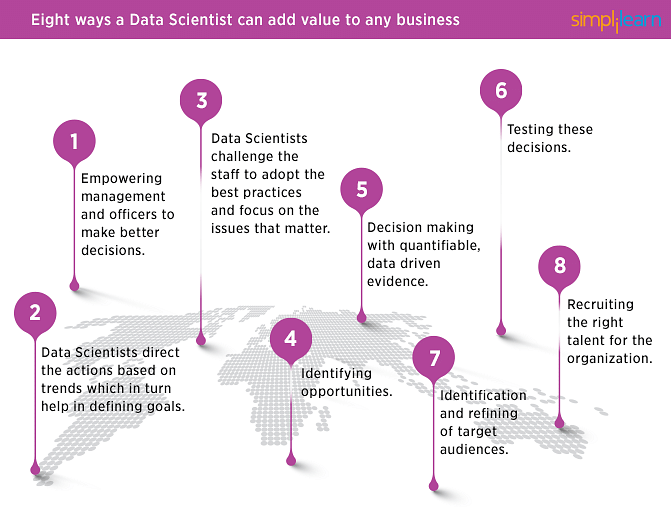Without the expertise of professionals who turn cutting-edge technology into actionable insights, Big Data is nothing. Today, more and more organizations are opening up their doors to big data and unlocking its power—increasing the value of a data scientist who knows how to tease actionable insights out of gigabytes of data.
It’s become a universal truth that modern businesses are awash with data. Last year, McKinsey estimated that big data initiatives in the US healthcare system “could account for $300 billion to $450 billion in reduced healthcare spending or 12 to 17 percent of the $2.6 trillion baselines in US healthcare costs”. On the other hand, though, bad data is estimated to be costing the US roughly $3.1 trillion a year.
It is becoming clear by the day that there is enormous value in data processing and analysis—and that is where a data scientist steps into the spotlight. Executives have heard of how data science is a sexy industry, and how data scientists are like modern-day superheroes, but most are still unaware of the value a data scientist holds in an organization. Let’s take a look at the benefits of data science.
Achieve your goals with our expertly designed business courses.
In this article we will talk about the following ways a data scientist can add value to business:
- Empowering management and officers to make a better decision
- Directing actions based on trends—which in turn help to define goals
- Challenging the staff to adopt best practices and focus on issues that matter
- Identifying opportunities
- Decision-making with quantifiable, data-driven evidence
- Testing these decisions
- Identification and refining of target audiences
- Recruiting the right talent for the organization
Check out the video below that talks about the top 5 reasons to learn data science in 2024.
What Does a Data Scientist Do?
Most data scientists in the industry have advanced and training in statistics, math, and computer science. Their experience is a vast horizon that also extends to data visualization, data mining, and information management. It is fairly common for them to have previous experience in infrastructure design, cloud computing, and data warehousing.
Here are some advantages of data science in business:
- Mitigating risk and fraud. Data scientists are trained to identify data that stands out in some way. They create statistical, network, path, and big data methodologies for predictive fraud propensity models and use those to create alerts that help ensure timely responses when unusual data is recognized.
- Delivering relevant products. One of the advantages of data science is that organizations can find when and where their products sell best. This can help deliver the right products at the right time—and can help companies develop new products to meet their customers’ needs.
- Personalized customer experiences. One of the most buzzworthy benefits of data science is the ability for sales and marketing teams to understand their audience on a very granular level. With this knowledge, an organization can create the best possible customer experiences.
If you want to learn more about becoming a Data Scientist or want to kickstart your Data journey, then check out our Caltech Data Science Program.
Why Data Science? 8 Ways a Data Scientist Can Add Value to Business

1. Empowering Management and Officers to Make Better Decisions
An experienced data scientist is likely to be a trusted advisor and strategic partner to the organization’s upper management by ensuring that the staff maximizes their analytics capabilities. A data scientist communicates and demonstrates the value of the institution’s data to facilitate improved decision-making processes across the entire organization, through measuring, tracking, and recording performance metrics and other information.
2. Directing Actions Based on Trends—which in Turn Help to Define Goals
A data scientist examines and explores the organization’s data, after which they recommend and prescribe certain actions that will help improve the institution’s performance, better engage customers, and ultimately increase profitability.
3. Challenging the Staff to Adopt Best Practices and Focus on Issues That Matter
One of the responsibilities of a data scientist is to ensure that the staff is familiar and well-versed with the organization’s analytics product. They prepare the staff for success with the demonstration of the effective use of the system to extract insights and drive action. Once the staff understands the product capabilities, their focus can shift to addressing key business challenges.
4. Identifying Opportunities
During their interaction with the organization’s current analytics system, data scientists question the existing processes and assumptions for the purpose of developing additional methods and analytical algorithms. Their job requires them to continuously and constantly improve the value that is derived from the organization’s data.
5. Decision Making with Quantifiable, Data-driven Evidence
With the arrival of data scientists, data gathering and analyzing from various channels has ruled out the need to take high stake risks. Data scientists create models using existing data that simulate a variety of potential actions—in this way, an organization can learn which path will bring the best business outcomes.
6. Testing These Decisions
Half of the battle involves making certain decisions and implementing those changes. What about the other half? It is crucial to know how those decisions have affected the organization. This is where a data scientist comes in. It pays to have someone who can measure the key metrics that are related to important changes and quantify their success.
7. Identification and Refining of Target Audiences
From Google Analytics to customer surveys, most companies will have at least one source of customer data that is being collected. But if it isn’t used well—for instance, to identify demographics—the data isn’t useful. The importance of data science is based on the ability to take existing data that is not necessarily useful on its own and combine it with other data points to generate insights an organization can use to learn more about its customers and audience.
A data scientist can help with the identification of the key groups with precision, via a thorough analysis of disparate sources of data. With this in-depth knowledge, organizations can tailor services and products to customer groups, and help profit margins flourish.
8. Recruiting the Right Talent for the Organization
Reading through resumes all day is a daily chore in a recruiter’s life, but that is changing due to big data. With the amount of information available on talent—through social media, corporate databases, and job search websites—data scientists can work their way through all these data points to find the candidates who best fit the organization’s needs.
By mining the vast amount of data that is already available, in-house processing for resumes and applications—and even sophisticated data-driven aptitude tests and games—data science can help your recruitment team make speedier and more accurate selections.
Choose the Right Program
Accelerate your career with Simplilearn's Data Science courses! Choose the right program tailored to your needs and become a data wizard. Gain in-demand skills, learn from industry experts, and unlock exciting job opportunities. Don't miss out on this chance to become a sought-after data scientist. Enroll today!
Program Name
Post Graduate Program In Data Science
Professional Certificate Course In Data Science
DS Master's
Geo Non US Program IN All Geos University Caltech IIT Kanpur Simplilearn Course Duration 11 Months 11 Months 11 Months Coding Experience Required No Yes Basic Skills You Will Learn 8+ skills including
Supervised & Unsupervised Learning
Deep Learning
Data Visualization, and more8+ skills including
NLP, Data Visualization, Model Building, and more10+ skills including data structure, data manipulation, NumPy, Scikit-Learn, Tableau and more Additional Benefits Upto 14 CEU Credits Caltech CTME Circle Membership Live masterclasses from IIT Kanpur faculty and certificate from E&ICT Academy, IIT Kanpur Applied Learning via Capstone and 25+ Data Science Projects Cost $$$$ $$$ $$ Explore Program Explore Program Explore Program
Conclusion
Data science can add value to any business who can use their data well. From statistics and insights across workflows and hiring new candidates, to helping senior staff make better-informed decisions, data science is valuable to any company in any industry.
Interested in a career in Data Science? Simplilearn offers the perfect Data Science course to help you learn everything you need to know about getting started as a Data Scientist. The Caltech Post Graduate Program In Data Science will set you up to succeed with instructor-led training from industry experts, as well as hands-on experience, practice tests, and high-quality eLearning content.
If you're confused on where to get started, the Data Science Career Guide will give you insights into the most trending technologies, the top companies that are hiring, the skills required to jumpstart your career in the thriving field of Data Science, and offers you a personalized roadmap to becoming a successful Data Science expert.
